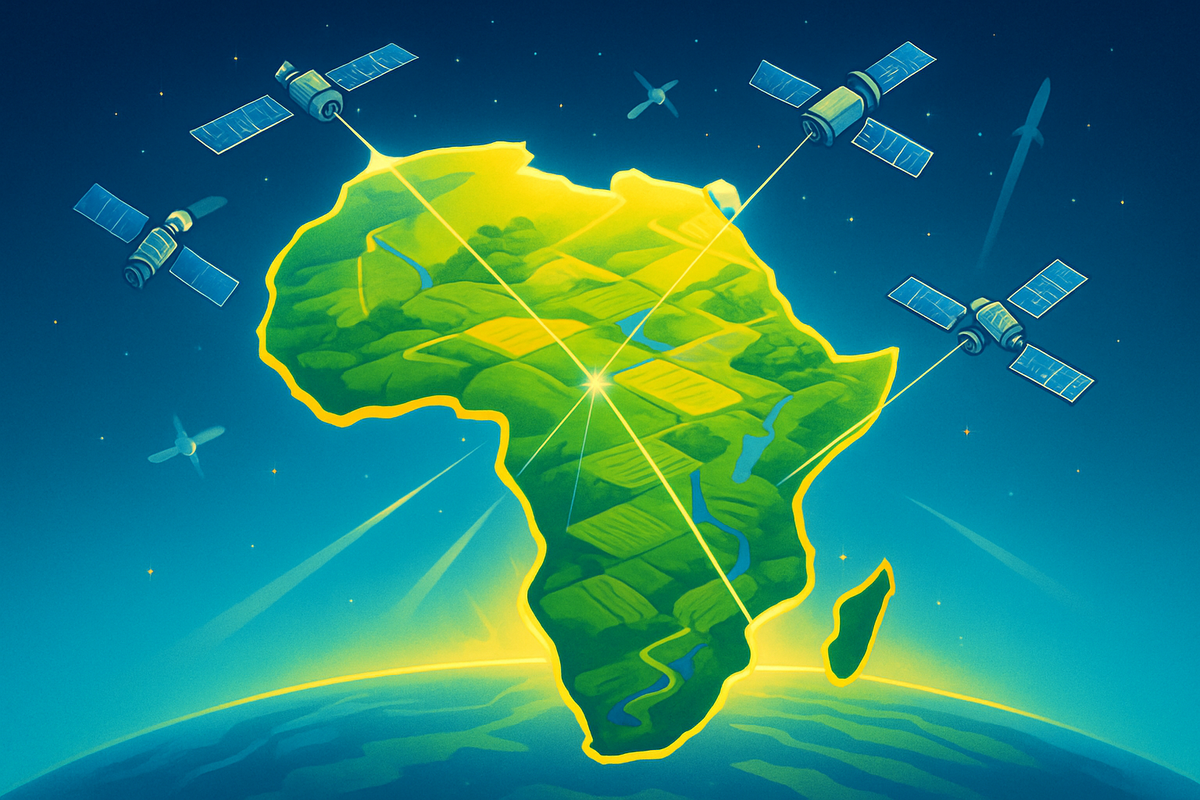
In a significant stride towards self-reliance and sustainable development, African nations are increasingly harnessing the power of space technology to address pressing challenges and unlock unprecedented growth opportunities. This strategic embrace of satellite communications, Earth observation, and navigation systems is not merely about launching rockets; it represents a profound shift in how the continent manages its resources, tackles climate change, ensures food security, and bridges the digital divide. The immediate implications are already tangible, with enhanced data-driven decision-making, a burgeoning innovation ecosystem, and a bolstered resilience against environmental vulnerabilities reshaping the socio-economic landscape across Africa and serving as a compelling blueprint for other developing nations.
The continent's burgeoning space sector is proving to be a critical enabler for achieving the UN Sustainable Development Goals and the African Union's Agenda 2063. By leveraging space-derived data, African countries are gaining real-time insights into critical areas such as precision agriculture, allowing farmers to optimize crop yields and combat food insecurity. Satellite monitoring provides invaluable early warning systems for natural disasters like droughts and floods, crucial for a continent highly susceptible to climate change impacts. Furthermore, satellite communication is instrumental in extending internet access to remote and underserved communities, fostering digital inclusion, supporting e-learning, and enabling secure financial services. This strategic investment in space capabilities is not only addressing immediate needs but also laying the groundwork for long-term economic diversification and technological advancement.
A New Frontier: The Rapid Expansion of African Space Initiatives
The narrative of Africa's engagement with space technology has rapidly evolved from nascent ambitions to a dynamic and expanding sector. To date, African nations have successfully launched 59 satellites, with projections indicating a significant increase to an estimated 110 by 2030, underscoring a clear commitment to developing indigenous space capabilities. Over 20 African countries have now established national space programs, with South Africa, Egypt, and Nigeria leading the charge in satellite deployment and technological expertise.
A pivotal moment in this continental endeavor was the official inauguration of the African Space Agency (AfSA) in 2023, headquartered in Cairo, Egypt. AfSA's mandate is crucial: to coordinate fragmented national efforts, foster greater cooperation among African states, and establish a unified regulatory framework for the continent's space activities. This agency is set to streamline collaborations with international partners and ensure that African space initiatives are aligned with continental priorities. The sector is also witnessing the rapid growth of the "NewSpace" industry, with over 300 private companies, many of them innovative startups, contributing to regional development. These companies are driving innovation in areas like AI/ML, robotics, and big data analytics, creating a vibrant ecosystem that attracts investment and fosters job creation. International collaborations, particularly with entities from China, the UK, and the European Space Agency (ESA), are also playing a significant role, facilitating technology transfer, joint training programs, and technical support to build local expertise and infrastructure. This concerted effort is transforming Africa into a significant player in the global space arena, with an industry valued at £16.16 billion in 2021 and projected to reach £18.77 billion by 2026.
Market Movers: Companies Poised to Win or Lose in Africa's Space Race
The burgeoning African space sector presents a compelling landscape for both established global players and emerging local enterprises. Companies involved in satellite manufacturing, launch services, ground station operations, and data analytics stand to gain significantly. Conversely, those slow to adapt or unable to offer tailored, cost-effective solutions for the African market may find themselves at a disadvantage.
Global satellite communication providers like SES S.A. (EPA: SESG) and Eutelsat Communications S.A. (EPA: ETL) are already key players, offering connectivity solutions across the continent. Their existing infrastructure and expertise in delivering broadband to remote areas position them well to capitalize on the increasing demand for digital inclusion. However, they will face growing competition from new entrants and the increasing focus on indigenous solutions. Companies specializing in Earth observation data, such as Maxar Technologies Inc. (NYSE: MAXR) and Planet Labs PBC (NYSE: PL), are crucial for providing the imagery and analytics needed for precision agriculture, resource management, and climate monitoring. Their ability to deliver actionable insights will be highly valued. On the African front, a host of "NewSpace" startups are emerging, often focusing on specific regional needs. While many are privately held, their growth could lead to future IPOs or acquisitions, offering investors new opportunities. Examples include companies developing small satellites for specific applications or those building local ground segment infrastructure. Additionally, technology companies that can integrate space-derived data into their services, such as those in agritech, logistics, and fintech, will also see increased demand. Companies like Farmerline (private) in Ghana, which utilizes satellite data to support smallholder farmers, exemplify this trend. The development of local manufacturing capabilities for satellite components and ground equipment will also create winners among engineering and manufacturing firms within Africa, reducing reliance on foreign imports and fostering local economic growth.
Broader Implications: Reshaping Geopolitics and Sustainable Development
Africa's increasing engagement with space technology extends far beyond economic gains, carrying profound implications for geopolitics, sustainable development, and global collaboration. This strategic pivot aligns with broader industry trends towards democratized access to space, where smaller, more affordable satellites and launch services are empowering more nations to participate. For Africa, it represents a crucial step towards reducing dependency on foreign data and services, enhancing national sovereignty, and ensuring that data collection and analysis are aligned with continental priorities.
The ripple effects on competitors and partners are significant. Traditional space powers must adapt their engagement strategies, moving beyond aid-based models to genuine partnerships that foster technology transfer and capacity building. This shift is evident in collaborations with China, the UK, and the European Space Agency, which are increasingly focusing on joint ventures and training. Regulatory and policy implications are also paramount. The establishment of AfSA is a critical move towards harmonizing fragmented national space policies, creating a unified framework that can attract investment, ensure responsible space utilization, and prevent orbital debris. This agency will play a vital role in representing African interests in international space governance forums. Historically, developing nations have often been consumers rather than producers of space technology. Africa's current trajectory marks a departure from this past, echoing the early space ambitions of nations like India and Brazil, which have successfully built robust indigenous space programs. This trend positions Africa not just as a beneficiary but as a significant contributor to global space endeavors, particularly in areas like Earth observation for climate resilience and sustainable resource management, where its unique geographical context offers invaluable data and insights.
The Path Ahead: Opportunities and Challenges in Africa's Space Horizon
The trajectory of Africa's space sector points towards a future brimming with opportunities, yet not without its challenges. In the short term, we can expect a continued surge in satellite launches, particularly those focused on Earth observation and communication, driven by both national programs and private "NewSpace" ventures. This will lead to an immediate improvement in data availability for critical sectors like agriculture, climate monitoring, and disaster management. The expansion of satellite broadband will also accelerate digital inclusion, connecting more remote communities and fostering e-commerce and digital services.
Longer-term possibilities include the development of more advanced indigenous manufacturing capabilities, potentially leading to the production of larger, more sophisticated satellites within Africa. We could also see a greater focus on space science and exploration, beyond purely utilitarian applications, as the continent's scientific and engineering talent pool grows. Strategic pivots will be essential for both governments and private companies. Governments will need to continue investing in STEM education and robust regulatory frameworks, while private firms must focus on innovative, cost-effective solutions tailored to African needs, leveraging technologies like AI and machine learning to maximize the utility of space data. Market opportunities will emerge in data analytics, ground segment infrastructure, and specialized applications for smart cities, precision health, and circular economies. However, challenges such as securing consistent funding, developing specialized human capital, and ensuring equitable access to space benefits will require sustained effort and international collaboration. Potential scenarios range from a rapid acceleration into a global space powerhouse, driven by strong public-private partnerships, to a more gradual, fragmented growth if funding and coordination efforts falter. Investors should watch for policy developments from AfSA, the success of major national satellite projects, and the emergence of scalable private ventures.
Orbiting Towards Prosperity: A Sustainable Future from Above
Africa's deliberate and accelerating embrace of space technology represents a pivotal moment for the continent, signaling a clear commitment to self-determined sustainable development. The journey from a consumer to a producer and innovator in the space sector is not merely about technological prowess; it's about empowering nations to address their most pressing challenges – from food security and climate change adaptation to digital inclusion and resource management – with unprecedented precision and autonomy. The establishment of the African Space Agency, the surge in satellite launches, and the vibrant "NewSpace" ecosystem underscore a continent actively shaping its destiny from orbit.
Moving forward, the market will increasingly reward companies that can offer tailored, scalable, and affordable space-based solutions for the African context. This includes providers of satellite connectivity, Earth observation data, and specialized analytics services, as well as firms contributing to local capacity building and infrastructure development. Investors should keep a close eye on the policy landscape, particularly the directives and initiatives emanating from AfSA, which will play a crucial role in harmonizing regulations and fostering collaboration. The success of key national space programs and the growth trajectories of innovative African space startups will also be vital indicators. Ultimately, Africa's ascent into space is more than a technological achievement; it is a testament to its ambition for a prosperous, resilient, and sustainable future, demonstrating the transformative power of space technology for all developing nations.
This content is intended for informational purposes only and is not financial advice






